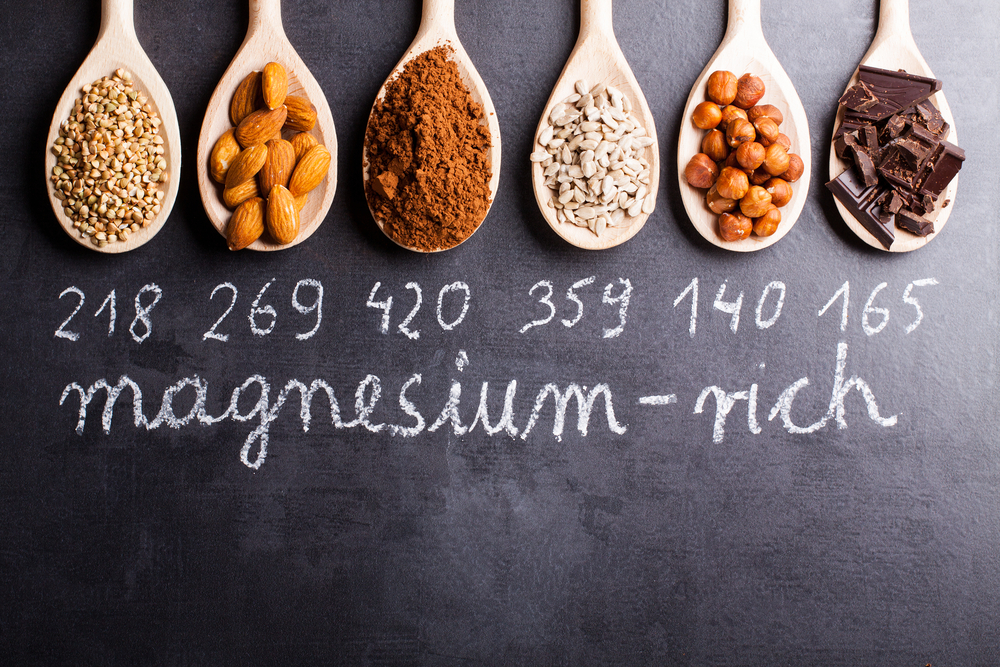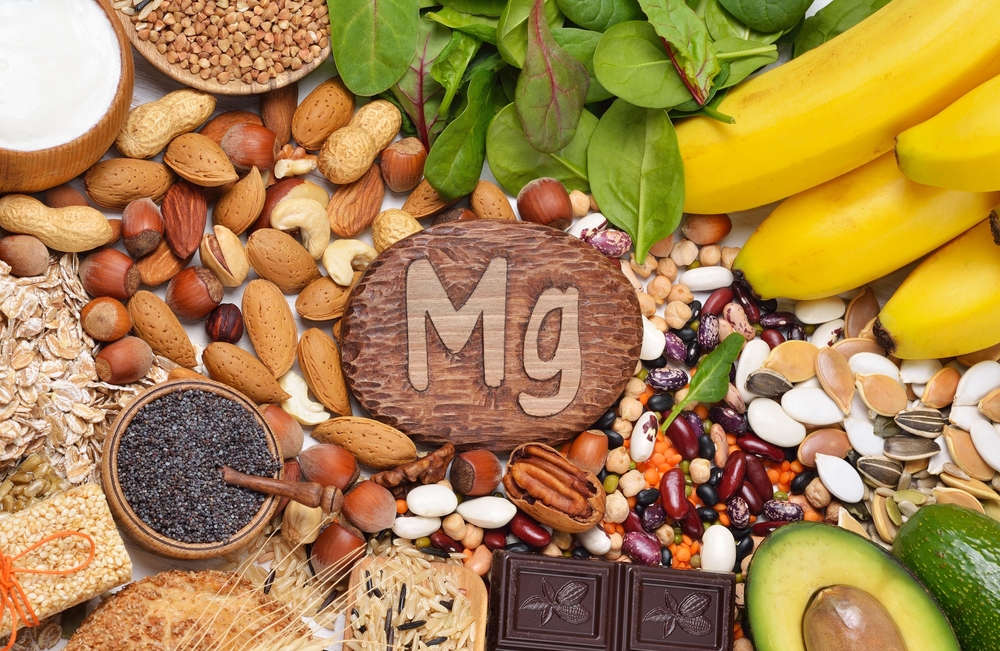In this newsletter I discuss how adding more magnesium to your diet may help to support a range of PMS symptoms and help to ease the natural transition through the menopause.
Magnesium is vital for many different aspects of health, including female hormone balance. Magnesium deficiencies are the second most common deficiency in developed countries, the first being vitamin D.
Unfortunately, the average Western diet, packed with beige, lifeless, convenience food, and low in nutrient-dense, colorful, wholefoods doesn’t typically deliver enough magnesium to fully support these processes. Busy 21st century lifestyles are a constant drain on the body’s magnesium stores too. Magnesium deficiencies are common in the western diet because grains are poor sources of magnesium. Other prominent sources of magnesium, like nuts and leafy vegetables, are just not eaten as often.
The intestinal absorption of magnesium varies depending on how much magnesium the body needs, so there are not very many side-effects associated with supplementation. If there is too much magnesium, the body will only absorb as much as it needs. However, excessive doses may cause gastrointestinal distress and diarrhea.
The effectiveness of magnesium has been demonstrated in a few studies and clinical trials, which are compiled into a 2017 literature review called “Magnesium in the gynecological practice”. In that review, the authors conclude that there is “an important role for magnesium for the prevention and the treatment of a number of conditions relevant for women’s health”
Magnesium calms the nervous system and reduces the activity of the hypothalamic-pituitary-adrenal (HPA) axis. The result is less anxiety, less cortisol, and a better capacity to cope with stress. Reduced stress can, in turn, have positive effects on your menstrual cycle and health.
Often nicknamed ‘nature’s tranquiliser’, magnesium can help to support symptoms of PMS and ease the menopausal transition too.
This powerful mineral also supports long term bone health which is a key consideration during the menopause.
Magnesium & PMS
PMS can occur in any woman during childbearing years. Magnesium’s nickname of ‘nature’s tranquiliser’ gives some clue as to how beneficial this mineral can be in supporting symptoms of pre-menstrual syndrome (PMS). There are many symptoms that fall under the umbrella term of PMS, ranging from low energy, headaches, food cravings and muscle cramps to anxiety, tension, low mood and many more in between. According to the National Association for Premenstrual Syndrome (NAPS) It is estimated that as many as 30% of women can experience moderate to severe PMS, with 5-8% suffering severe PMS/PMDD, this being around 800,000 in the UK. Lifestyle changes: reducing stress, diet, exercise, limiting alcohol and smoking can improve PMS symptoms but they will be insufficient in managing moderate to severe PMS. There is evidence that certain complementary therapies may be of benefit in such cases Magnesium in particular.
Certainly, it isn’t a magic bullet that can be used to beat PMS, magnesium does however come pretty close.
Women with PMS have been found to have lower blood levels of magnesium than those without PMS. For symptoms of anxiety and tension, magnesium may help to calm everything down, and some studies show that it works even better when combined with vitamin B6. For PMS, magnesium may help to reduce anxiety and tension, balance mood, reduce cravings, relax painful muscle cramps and alleviate menstrual headaches. Stress is a common contributing factor to PMS and magnesium as discussed above calms the nervous system and reduces the activity of the hypothalamic-pituitary-adrenal (HPA) axis. Thus, helping to balance out stress hormones, tackling the symptoms of PMS right at the root cause.
Magnesium & Menopause
The menopause is not a health problem, but rather a natural transition process that every woman goes through. Each woman has a supply of eggs (approximately 2 million) from the moment she is born and over the years they are used up and die off. She finally reaches a certain age when there simply aren’t any more. The balance of hormones changes and production of oestrogen in the ovary’s declines.
Common menopausal symptoms include hot flushes, low libido, thinning hair, night sweats, mood swings, headaches and increased osteoporosis risk. The interesting thing is that as the ovaries decline their production of oestrogen, nature has something else up her sleeve. We are also able to produce a form of oestrogen (called oestrone) from our adrenal glands in order to compensate for the decline from the ovaries. Since the adrenal glands also help us to deal with stress, it’s crucial to reduce and support stress during the menopause to ensure the adrenals can cope with these extra demands. Magnesium has a vital role to play here since it helps to support a healthy balanced stress response. Other menopausal symptoms such as headaches and mood swings may also benefit from additional magnesium in the diet.
Among many other uses in the body, the hormone oestrogen helps to protect your bones, so when oestrogen production declines during the menopause, the risk of osteoporosis increases. Whilst calcium is an important mineral for healthy bones, Magnesium is just as important for your bones. It helps in metabolising calcium and vitamin C and helps to convert vitamin D to the active form necessary to ensure that calcium is efficiently absorbed by your body.
Not having enough magnesium can stop bone growth, decrease bone cell activity and make the bones more fragile. Magnesium also prevents the build-up of unwanted calcium deposits elsewhere in the body.
Many people get good sources of calcium in their diet, but most typical Western diets are lacking in magnesium. Ensuring optimal intake of magnesium before, during and after the menopause is therefore vital to support strong, healthy bones for life.
Magnesium in food & supplements

The best food sources of magnesium are green leafy vegetables, wholegrains, nuts, seeds, beans and sea vegetables such as kelp. And to give you an idea of how much you need to eat just to meet standard daily requirements you’d need the equivalent of 1 avocado, 1 cup cooked spinach, 1 cup cooked black beans and 100g tofu every single day! And for anyone with higher magnesium requirements, such as those struggling with PMS or menopausal symptoms these quantities would need to be increased. To achieve optimal daily amounts, especially for anyone with increased needs, supplementation is often recommended.
